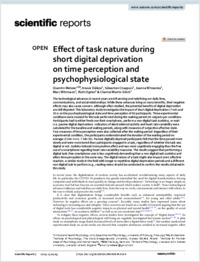Effect of task nature during short digital deprivation on time perception and psychophysiological state
PSPE
- Meteier, Quentin ORCID Clinical and Health Psychology Unit, Department of Psychology, University of Fribourg, Switzerland
- Délèze, Anouk Clinical and Health Psychology Unit, Department of Psychology, University of Fribourg, Switzerland
- Chappuis, Sébastien ORCID Clinical and Health Psychology Unit, Department of Psychology, University of Fribourg, Switzerland
- Witowska, Joanna Institute of Psychology, The Maria Grzegorzewska University, Warsaw, Poland
- Wittmann, Marc ORCID Institute for Frontier Areas of Psychology and Mental Health, Freiburg, Germany
- Ogden, Ruth ORCID School of Psychology, Liverpool John Moores University, Liverpool, England
- Martin-Sölch, Chantal ORCID Clinical and Health Psychology Unit, Department of Psychology, University of Fribourg, Switzerland
- 2025
Published in:
- Scientific Reports. - Springer Nature. - 2025, vol. 15, p. 1-15
Digital deprivation
Digitalization
Heart rate variability
Physiology
Skin conductance
Sudoku
Task nature
Time perception
Waiting period
English
The technological advances in recent years are influencing and redefining our daily lives, communications, and social relationships. While these advances bring us many benefits, their negative effects may also cause concern. Although often studied, the potential benefits of digital deprivation are still disputed. This laboratory study investigates the impact of short digital deprivation (7 min and 30 s) on the psychophysiological state and time perception of 90 participants. Three experimental conditions were created for the task performed during the waiting period (30 subjects per condition). Participants had to either freely use their smartphone, perform a non-digital task (sudoku), or wait (i.e. passive digital deprivation). Indicators of electrodermal activity and heart rate variability were calculated for the baseline and waiting periods, along with measures of subjective affective state. Four measures of time perception were also collected after the waiting period. Regardless of their experimental condition, the participants underestimated the duration of the waiting period on average (5 min 44 vs. 7 min 30). Passive digitally deprived participants felt that the time passed more slowly and were more bored than participants engaged in a task, regardless of whether the task was digital or not. Sudoku induced more positive affect and was more cognitively engaging than the free use of a smartphone regarding heart rate variability measures. The results suggest that performing a digital task (free smartphone use) is less cognitively demanding than a non-digital task (sudoku) and alters time perception in the same way. The digital nature of a task might also impact one’s affective reaction. A similar study in the field with longer or repetitive digital deprivation periods and a different non-digital task to perform (e.g., reading news) should be conducted to confirm the results obtained in this study.
- Faculty
- Faculté des lettres et des sciences humaines
- Department
- Département de Psychologie
- Language
-
- English
- Classification
- Psychology
- License
- Open access status
- gold
- Identifiers
-
- DOI 10.1038/s41598-025-94316-3
- ISSN 2045-2322
- Persistent URL
- https://folia.unifr.ch/unifr/documents/331667
Statistics
Document views: 130
File downloads:
- meteier_et_al-2025-scientific_reports_1: 71
